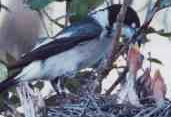Listen With Your Eyes
 In order to understand birds, one has to pay attention with both ones ears and eyes. In other words we need to hear the sounds they are making while also following their actions. I call this 'Listening With Your Eyes'.
In order to understand birds, one has to pay attention with both ones ears and eyes. In other words we need to hear the sounds they are making while also following their actions. I call this 'Listening With Your Eyes'.
Birds love chattering and sharing the days news with each other. Every bird species has its own language. The different species don't have much difficulty following each other. The birds also have a range of soft almost inaudible 'mm', 'bb' type sounds and a lot of their communication is also non-verbal.
If we want to understand what the bird is saying, we need to start connecting their actions with their sounds.
If you have already started observing them and keeping a journal, you will find that some of the news they give you relates to events that happened earlier in the day.
Other times they are trying to tell you about things that are going to happen in their lives. Another bird may drop in for a visit. Or your bird or birds may go away for a few days to visit their friends. Young adults will leave home for 1-3 days at a time trying out various groups until they find a young group they'd like to join. If your bird family has only one chick, a single chick from another family may join them for a visit or even be adopted by them so that the young ones have company. Before leaving home the kids will always do something different, so as to spend a little more time with you and say goodbye.
They worry about you too. If you have been away for a few days or they haven't seen you for a few days because you were sick or not in the outdoors mood, they will come looking for you.
They will bring you their new friends, their intended mates and their new bubs to keep you in the news and to show you that you matter to them as well.
We have to be open to these gestures, by listening to the tone of their voice and looking around to see what else is happening, where they are flying to, who is accompanying them, whom do they invite to eat with them, how long does the new comer stay?
Once we were visiting Vicky magpie at her nest in the wooded area. Larry butcherbird who was one her friends hadn't been around for weeks. We knew he was still around the ridges as we could hear him call out occasionally. As we left Vicky's area, Larry started to call us with a different song. When we tried to approach, he flew off to the other side. We decided to follow him and his singing got excited as he saw us making our way across the fields, crawling under barbed-wire fences, walking around the steep gully through the paddocks to other side of the valley. There we found with his mate Harrie. She had built her nest on a tall tree at the bottom of the ravine. The two were so excited that we had trekked all the way to see them. When we left they sang yet another new phrase as we walked back - which sounded just like thank you. You can view Larry and Harries story & slideshow by clicking here.
around for weeks. We knew he was still around the ridges as we could hear him call out occasionally. As we left Vicky's area, Larry started to call us with a different song. When we tried to approach, he flew off to the other side. We decided to follow him and his singing got excited as he saw us making our way across the fields, crawling under barbed-wire fences, walking around the steep gully through the paddocks to other side of the valley. There we found with his mate Harrie. She had built her nest on a tall tree at the bottom of the ravine. The two were so excited that we had trekked all the way to see them. When we left they sang yet another new phrase as we walked back - which sounded just like thank you. You can view Larry and Harries story & slideshow by clicking here.
If we had dismissed his calls we would have missed out on another wonderful experience.
If you would like to know more about 23 Amazing Facts About Wild Bird Culture with true stories - click on this link and enter your details.
To read the earlier articles in this blog challenge click here.
Until tomorrow,
Cheers
Gitie

 del.icio.us
del.icio.us Digg
Digg Facebook
Facebook Google
Google Google+
Google+ LinkedIn
LinkedIn MySpace
MySpace Ping This!
Ping This! SlashDot
SlashDot StumbleUpon
StumbleUpon Twitter
Twitter Yahoo
Yahoo



